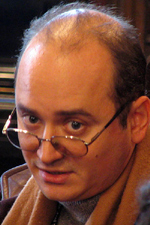> [Archived] Interviews

Interview with composer Dan Dediu
Friday, 1 May 2009
, ora 12.24
At
250 years since the passing into eternity of composer Georg Friedrich
Händel, the European Broadcasting Union launched an original musical
project, named Händel, a new appearance , and on this occasion
the composer Dan Dediu was invited by Radio Romania Music to
write a work on the theme derived from Water Music by Händel.
Therefore, the part Rain Music - Händel in Macondo was created,
which was recorded and broadcasted by Radio Romania Music on April 13th
2009, a day before the commemoration of the German composer. At the
very first audition of the work Rain Music -Händel in Macondo
in the "Mihail Jora" Studio, composer Dan Dediu shared a few of his
"secrets".
What can you tell us about this work?
This work was requested by Radio Romania Music; I thought I should write a short and at the same time very different work from what I have composed so far. I chose a folk instrument - the tarogato, an instrument with multiple timbre values, but that is in fact fairly 'barbarous' from the technical point of view - it has maximum three or four tonalities. I had the chance to work with a fascinating tarogato player, the oboe player and saxophonist Adrian Petrescu. It is for him that I have written this work, that combines a minuet from Water Music by Händel with an imaginary Balkan 'geography', so that I got a musical formula that can be a sound background for the famous novel of the Columbian Gabriel García Márquez - One hundred years of solitude . Thus, I named the work Händel in Macondo, that famous imaginary city where it rains all the time. By a parallelism between Water Music by Händel and 'Rain Music' by Marquez, I composed this work, where the rain combines with Händel, with an acute feeling of dreaming and - why not? - with a melancholic Balkan-type world, induced by the soft tones of the cembalo and the striking and at the same time nostalgic presence of the tarogato.
How would you say a 20th century composer looks at Händel music?
Of course - although chronologically we are in the 21st century, I got my music education in the 20th century: we were educated rather not to do, than to do some things that we would have liked to do. At first, for me Händel represented a 'canonical' composer, obviously, a composer that is - as Nietzsche would say - Beyond good and evil - an existential 'datum'. By studying him in more detail, I noticed that, as any other composer, Händel has his 'ups' and 'downs', but also his 'naiveties'. The minuet in Water Music that I used in a certain way in this evocative piece, represented such a 'naïve' music and perhaps for some people it was very 'cinema-like', because I can not hide the fact that at the origin of the musical piece Rain Music - Händel in Macondo was not only Water Music by Händel, but also Ennio Morricone's music and, obviously, much modern music, filtered by what I considered is Romanian music.
What can you tell us about this work?
This work was requested by Radio Romania Music; I thought I should write a short and at the same time very different work from what I have composed so far. I chose a folk instrument - the tarogato, an instrument with multiple timbre values, but that is in fact fairly 'barbarous' from the technical point of view - it has maximum three or four tonalities. I had the chance to work with a fascinating tarogato player, the oboe player and saxophonist Adrian Petrescu. It is for him that I have written this work, that combines a minuet from Water Music by Händel with an imaginary Balkan 'geography', so that I got a musical formula that can be a sound background for the famous novel of the Columbian Gabriel García Márquez - One hundred years of solitude . Thus, I named the work Händel in Macondo, that famous imaginary city where it rains all the time. By a parallelism between Water Music by Händel and 'Rain Music' by Marquez, I composed this work, where the rain combines with Händel, with an acute feeling of dreaming and - why not? - with a melancholic Balkan-type world, induced by the soft tones of the cembalo and the striking and at the same time nostalgic presence of the tarogato.
How would you say a 20th century composer looks at Händel music?
Of course - although chronologically we are in the 21st century, I got my music education in the 20th century: we were educated rather not to do, than to do some things that we would have liked to do. At first, for me Händel represented a 'canonical' composer, obviously, a composer that is - as Nietzsche would say - Beyond good and evil - an existential 'datum'. By studying him in more detail, I noticed that, as any other composer, Händel has his 'ups' and 'downs', but also his 'naiveties'. The minuet in Water Music that I used in a certain way in this evocative piece, represented such a 'naïve' music and perhaps for some people it was very 'cinema-like', because I can not hide the fact that at the origin of the musical piece Rain Music - Händel in Macondo was not only Water Music by Händel, but also Ennio Morricone's music and, obviously, much modern music, filtered by what I considered is Romanian music.
Andra Ivanescu
Translated by Zenovia Popa & Elena Gheorghe
MA Students, MTTLC, Bucharest University
Translated by Zenovia Popa & Elena Gheorghe
MA Students, MTTLC, Bucharest University
Return to archived Interviews














